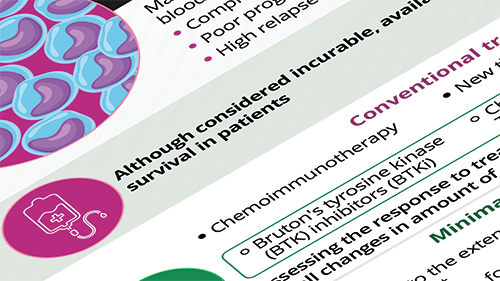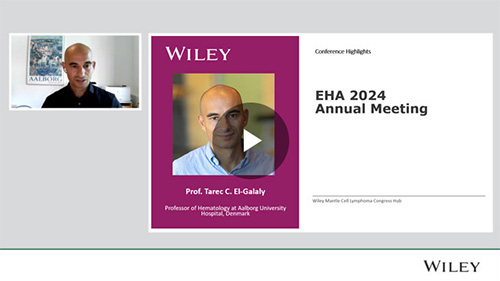Mantle Cell Lymphoma - Clinical Evaluation, Diagnosis, and Novel Treatments
Highlights from the 65th 2023 American Society of Hematology (ASH) Annual Meeting & Exposition on Blood and Bone Marrow Disorders and some sessions dedicated to ‘Mantle Cell, Follicular, and Other Indolent B Cell Lymphomas’
Abstract
A conference on malignant and non-malignant hematology was organized by the American Society of Hematology (ASH) from December 6–15, 2023 that participants could attend in person in San Diego as well as through ASH’s virtual meeting platform. The conference facilitated the global exchange of scientific information and clinical insights related to the field of hematology.
A significant highlight of the conference was discussions on the diagnosis and emerging treatment approaches for mantle cell lymphoma (MCL). This article provides key insights and perspectives on the various prognostic factors, different clinical trials, as well as progress in treatment outcomes of MCL patients.
Introduction
Mantle cell lymphoma (MCL) is a rare malignancy and a highly aggressive type of blood cancer. Even though MCL is incurable, treatments can prolong survival and maintain the quality of life of patients.1 The conventional treatment approach for MCL usually involves chemoimmunotherapy and stem cell transplant (SCT).1 The vital indicators for assessing treatment outcomes are progression-free survival (PFS), which refers to the length of time during and after treatment when the disease does not worsen, and overall survival (OS), which measures the length of time from either the diagnosis or the start of treatment until death from any cause.
With the advent of new therapeutic drugs like bruton tyrosine kinase inhibitors (BTKi), chimeric antigen receptor T-cells (CAR-T), and immunomodulatory drugs, such as lenalidomide, the OS of MCL patients have improved. Additionally, incorporating rituximab maintenance therapy after SCT has also shown promising approach, with improved PFS and OS of MCL patients. The largest retrospective review evaluating treatment trends and OS outcomes in patients with MCL demonstrate significant improvement in OS due to the introduction of novel agents such as BTKi.1
An essential factor in MCL treatment is determining minimal residual disease (MRD), which refers to the amount of tumor cells persisting in a patient's blood or bone marrow after treatment. Therefore, involving MRD technologies can be immensely helpful for clinicians in determining the best course of treatment and predicting treatment outcomes.
Predictability and timing of MRD
MRD acts as a chief predictive tool for assessing the relative success of treatment for MCL. Testing negative for MRD suggests an undetectably low tumor cell count and deep remission. However, the disease may reoccur in patients testing positive for MRD subsequently.
Work presented by Yanshan Huang and colleagues highlighted that the optimal time for assessing MRD after four treatment cycles emerges as the best predictor of survival prognosis in patients with MCL.2 Additionally, the researchers also found that the time frame in which patients achieve MRD-negative status does not predict survival outcomes, underscoring the need for tailored approaches to MRD testing and interpretation in MCL.
Next-generation sequencing and MRD
Next-generation sequencing techniques can enhance the precision of MRD assessment, particularly in diseases like MCL, where symptoms may not be readily apparent.
A presentation by Danielle McQuinn and colleagues has shown that MRD testing using next-generation sequencing after two cycles of chemotherapy can predict remission duration and the need for further maintenance therapy in MCL patients.3
Prognostic value of BCL6+
Bcell lymphoma 6 (BCL6) is a unique protein found in B lymphocytes. Rarely, MCL presents as a rare immunotype variant with the overexpression of BCL6 (BCL6+ MCL).
A meta-analysis study by Daniel Park and colleagues has found that the positivity rate of BCL6 in the cells of MCL patients is inversely related to survival.4 The researchers also found that BCL6 expression is linked to the expression of a cell surface protein in CD10, and a transcription factor called SOX11 in MCL. Their findings suggest that measuring the expression of BCL6 may provide additional information about prognostic categorization, management, classification, and treatment of MCL variants.
Prognostic value of POD24
The prognostic value of PFS in MCL patients is considered to be a proxy for OS, although its validity has not yet been tested.
In the presentation, Clementine Sarkozy and colleagues confirmed that the utility of PFS at 24 months (POD24) could serve as a potential surrogate for OS.5 They used an extensive dataset of French patients taken from six randomized clinical trials. The presented findings underscore the significance of POD24 as a prognostic marker in MCL, shedding light on its potential utility in guiding clinical decision-making.
Prognostic value of TP53 mutations and treatment
The prognostic significance of mutations in the gene of tumor protein 53 (TP53) and the impact on MCL treatment outcomes is considered as a crucial factor. TP53 mutations are detected in roughly 10% to 20% of patients diagnosed with MCL. These mutations can be varied, and modern sequencing tools facilitate their accurate identification. A study by Carrie I Ho and colleagues suggests that the variation may not be linked to differences in MCL treatment outcomes.6 However, the researchers confirmed that the expression of TP53 is linked to poor prognosis.
Exploring different treatment paradigms, the efficacy of zanubrutinib, obinutuzumab, and venetoclax (BOVen) for treating TP53-mutant MCL is currently under investigation. Recently released results from a multicenter phase 2 trial, as discussed by Anita Kumar and colleagues indicate that an outpatient regimen of BOVen is well-tolerated and linked to both high response rates and remarkable rates of undetectable MRD in untreated TP53-mutant MCL.7
CDC20: A new therapeutic target
Cell division cycle 20 homologue (CDC20) is a protein that plays a crucial role in cell division. The overexpression of CDC20 has been associated with the prediction of disease progression and patient survival in several types of cancers.8
In another presentation, Yingtong Chen and colleagues have demonstrated the increased expression of CDC20 in pathological tissues of MCL patients and MCL cells compared to healthy patients and cells, respectively.8 Therapeutic drugs that target the expression of CDC20 may form an important treatment strategy for MCL in the future.
Progress in treatment outcome
Treatment outcomes for MCL patients have improved with the greater availability of new frontline drugs. Over the last two decades, treatment outcomes have improved markedly, although the improvements are limited in patients aged ≥80.9
Impact of age on treatment outcome
Older MCL patients have poor prognosis, and they may be too weak to undergo intense chemotherapy or radiotherapy. A chemotherapy-free treatment strategy involving acalabrutinib with rituximab has recently shown promise as a frontline treatment in phase 2 trials involving older MCL patients.10 The OS of patients aged 80 years or older remains constrained, exhibiting marginal improvement. This underscores a substantial gap in meeting the therapeutic needs of this age group, emphasizing the pressing necessity for treatments offering enhanced tolerability and efficacy.
Treatment breakthroughs
In newly diagnosed MCL patients, phase 2 trials of a chemotherapy-free regimen involving the drugs zanubrutinib and rituximab have demonstrated efficacy and tolerability.11 The combination of drugs orelabrutinib, lenalidomide, and rituximab (OLR) showed a promising effect in phase 2 trials in China (POLARIS Study) with potential synergistic antitumor effects shown by the therapeutic agents.
Trials involving rituximab
The monoclonal antibody rituximab is part of several first line treatments for MCL. A phase 2 trial involving rituximab, chemotherapy, and acalabrutinib followed by stem cell transplantation has demonstrated alleviation of cancer symptoms in 91% of participants, indicating an impressive complete response rate.12
Interestingly, a randomized control study that compared treatment regimens involving rituximab and obinutuzumab has found that the latter is associated with comparatively higher PFS and OS.13
Predicting relapse
Understanding the risk of MCL relapse is crucial while planning the course of treatment. The chance of relapse also determines the level of patient surveillance required. A novel machine learning algorithm developed by Alba Cabirta Touzón and colleagues has demonstrated the ability to predict early progression of MCL using patient characteristics obtained at diagnosis.14 They developed a novel prognostic model index for predicting the risk of early relapse from the time of diagnosis.
Treating relapsed/refractory MCL
Despite advances in treatment, many MCL patients experience disease recurrence after achieving remission. Several novel treatments are now emerging for treating relapsed MCL, as well as for refractory MCL, which has stopped responding to treatment after initial success.
A preliminary phase 1 trial for the treatment of relapsed/refractory MCL using the drugs acalabrutinib, venetoclax, and obinutuzumab (AVO) has shown encouraging results.15 This combination of therapeutic agents may lead to a safe and effective treatment.
In another presentation, the drug pirtobrutinib has demonstrated efficacy in treating relapsed/refractory MCL. The phase 1/2 study examined its effects on patients who had previously received extensive treatment with covalent (c) BTKi16. Reports from the first human trial involving the novel BTKi called LP-168 suggests that this first-line treatment approach could still be adapted for relapsed/refractory MCL.17
A much-awaited phase 3 trial will shortly be underway for assessing monotherapy using glofitamab for relapsed/refractory MCL.18
CAR-T cell therapy for r/r MCL
An innovative approach for treating relapsed/refractory MCL involves leveraging a patient’s immune T cell to attack a tumor. CAR-T cell therapy is a groundbreaking form of immunotherapy for treating patients who have undergone extensive treatment using other approaches without success.
A phase 1 clinical trial was recently launched to assess a CAR-T cell-based drug called IM19 and initial results from the trial are promising.19
Another CAR-T cell-based drug called relmacabtagene autoleucel (relma-cel) has demonstrated high overall response and tolerability in phase 2 trials for treating relapsed/refractory MCL.20 A real-world analysis of a similar drug, brexucabtagene autoleucel (brexu-cel), has revealed a post CAR-T-cell therapy survival of 1.9 years in high-risk groups.21
Effect of gender, race, and ethnicity
On a population level, ethnicity, and race often influence access to vital resources and medical facilities. The largest-ever study assessing the clinical outcomes of MCL patients who are Black has revealed some concerning trends. A US-based analysis has revealed that MCL patients who are Black are diagnosed earlier with the disease and have worse overall survival rates compared to their White counterparts. Among MCL patients who are Black, there may also be a greater preponderance of the disease among women than in men.22
MCL is not the leading cause of death after EFS24
Event-free survival (EFS) is the period after treatment until disease relapse or death of the patient. In recent decades, with advancements in the first line therapies for MCL, the 24-month event-free survival (EFS24) of patients have also improved. An outcome presented by Yucai Wang has now revealed that MCL is not the leading cause of death in patients who have attained EFS24 through first line immunotherapy.23,24
Conclusion
These insights deepen our understanding of MCL and highlight areas where research must focus on next.
References
- Ermann, D. A., Vardell, V. A., Fitzgerald, L., Shah, H., Bock, A. M., Stephens, D. M., & Hu, B. (2023). Trends in survival outcomes for mantle cell lymphoma in the era of Novel Therapies. Blood, 142(Supplement 1), 1669.
- Huang, Y., Yan, Y., Yu, Y., Li, Y., Lv, R., Wang, T., … & Yi, S. (2023). The prognostic impact of measurable residual disease dynamics in mantle cell lymphoma. Blood, 142(Supplement 1), 3038.
- McQuinn, D., Hyun, M., Kim, K., Kenkre, V. P., Fletcher, C. D., Rajguru, S., … & Chang, J. (2023). Minimal residual disease (MRD) testing by next generation sequencing (NGS) after two cycles (CY) of non-intensive chemoimmunotherapy is predictive of remission duration and need for maintenance therapy (MT) in previously untreated mantle cell lymphoma (MCL): A Wisconsin Oncology Network Study. Blood, 142(Supplement 1), 4407.
- Park, D., Jeon, W. J., Joung, B., Pham, B., Hino, C., Lee, J., … & Castillo, D. R. (2023). Meta-analysis of the prognostic significance of BCL6+/CD10+ mantle cell lymphoma. Blood, 142(Supplement 1), 4420.
- Sarkozy, C., Chartier, L., Ribrag, V., Gressin, R., Geisler, C. H., Kluin‐Nelemans, H. C., … & Cheminant, M. (2023). Validation of POD24 As a robust early clinical end point of poor survival in mantle cell lymphoma from 1280 patients on clinical trials. Blood, 142(Supplement 1), 299.
- Ho, C., Wu, D., Wu, Q., Ng, K., Voutsinas, J., Lynch, R. C., … & Smith, S. D. (2023). Heterogeneity of TP53 mutations in mantle cell lymphoma- Challenges in risk stratification and subclassification. Blood, 142(Supplement 1), 3047.
- Kumar, A., Soumerai, J. D., Abramson, J. S., Barnes, J. A., Caron, P., Chabowska, M., … & Zelenetz, A. D. (2023). A multicenter phase 2 trial of Zanubrutinib, Obinutuzumab, and Venetoclax (BOVen) in patients with treatment-naïve, TP53-mutant mantle cell lymphoma. Blood, 142(Supplement 1), 738.
- Chen, Y., Yang, P., Wang, J., Gao, S., Ke, X., & Jing, H. (2023). Inhibition of CDC20 suppressed the development and progression of mantle cell lymphoma. Blood, 142(Supplement 1), 4416.
- Wang, J. F., Zhou, J., Hwang, S. R., Diefenbach, C., Ruan, J., Martin, … & Wang, Y. (2023). A National Cancer Database study of survival trends in patients with mantle cell lymphoma stratified by age group. Blood, 142(Supplement 1), 1663.
- Jain, P., Ok, C. Y., Nastoupil, L. J., Westin, J. R., Hill, H. A., Nair, R., … & Flowers, C. R. (2023). Acalabrutinib with rituximab as first-line therapy for older patients with mantle cell lymphoma - a phase II clinical trial. Blood, 142(Supplement 1), 3036.
- Qu, C., Ping, N., Zou, R., He, J., Zhu, Q., Xiao, Z., … & Jin, Z. (2023). Zr Study: A prospective phase II study of Zanubrutinib-Rituximab chemo-free therapy with or without autologous stem cell transplantation in newly diagnosed mantle cell lymphoma. Blood, 142(Supplement 1), 1658.
- Zhang, H., Su, L., Liu, L., Bai, O., Zheng, S., Zhao, Z., … & Meng, B. (2023). A prospective multicenter phase II study of Orelabrutinib-Lenalidomide-Rituximab (OLR) in patients with untreated mantle cell lymphoma (MCL) in China (POLARIS Study): preliminary analysis on efficacy, safety, mutation spectrum and impact of mutation profiling on treatment responses. Blood, 142(Supplement 1), 736.
- Villa, D., Larouche, J., Cheung, M. C., Keating, M., Zukotynski, K., Tonseth, R. P., … & Kuruvilla, J. (2023). Rituximab combined with chemotherapy and acalabrutinib prior to autologous stem cell transplantation in mantle cell lymphoma: the Rectangle Trial. Blood, 142(Supplement 1), 3042.
- Sarkozy, C., Callanan, M., Thiéblemont, C., Obéric, L., Burroni, B., Bouabdallah, K., … & Gouill, S. L. (2023). Obinutuzumab versus rituximab in transplant eligible untreated MCL patients, a matching comparison between the Lyma and Lyma-101 Trials. Blood, 142(Supplement 1), 980.
- Touzón, A. C., Orgueira, A. M., Garces, V. N., Abrisqueta, P., Pereda, R., Santos, C., ... & Niebla, A. M. (2023). A novel machine-Learning model to predict early relapse in mantle cell lymphoma (MCL). Blood, 142(Supplement 1), 1675.
- Kim, A. I., Armand, P., Redd, R., Forsyth, M., Branch, P., Pazienza, S., … & Murakami, M. A. (2023). Phase I safety and preliminary efficacy of Acalabrutinib, Venetoclax, and Obinutuzumab (AVO) in patients with relapsed/refractory mantle cell lymphoma. Blood, 142(Supplement 1), 3031.
- Cohen, J. B., Shah, N. N., Jurczak, W., Zinzani, P. L., Cheah, C. Y., Eyre, T. A., … & Wang, M. L. (2023). Pirtobrutinib in relapsed/refractory (R/R) mantle cell lymphoma (MCL) patients with prior cBTKi: safety and efficacy including high-risk subgroup analyses from the phase 1/2 BRUIN Study. Blood, 142(Supplement 1), 981.
- Song, Y., Cai, Q., Jiang, M., Zhou, K., Zhang, L., Sun, X., … & Zhu, J. (2023). A novel dual covalent and non-covalent next generation inhibitor of Bruton’s tyrosine kinase LP-168 in patients with relapsed/refractory B cell non-Hodgkin lymphoma: safety and efficacy results from a phase 1 study. Blood, 142(Supplement 1), 4400.
- Phillips, T., Matasar, M. J., Eyre, T. A., Giné, E., De L’Étang, A. F., Byrne, B., … & Qayum, N. (2023). GLOBRYTE: A phase III, open-label, multicenter, randomized trial evaluating glofitamab monotherapy in patients with relapsed or refractory mantle cell lymphoma. Blood, 142(Supplement 1), 3052.
- Yang, P., Liu, S., Zhang, W., Wang, J., & Jing, H. (2023). Phase I study of a CD19-directed CAR-T cell therapy for relapsed/refractory mantle cell lymphomas (MCL). Blood, 142(Supplement 1), 4423.
- Song, Y., Zhou, K., Li, L., Liang, A., Qin, Y., Zhang, X., … & Zhu, J. (2023). Safety and efficacy of relmacabtagene Autoleucel (relma-cel) in adults with relapsed/refractory mantle cell lymphoma (r/r MCL): Updated results from a phase II open-label study in China. Blood, 142(Supplement 1), 3024.
- Hess, G. (2023). Real World Results of Brexucabtagene Autoleucel for Patients with Relapsed/Refractory Mantle Cell Lymphoma - First German/Swiss Analysis. https://ash.confex.com/ash/2023/webprogram/Paper182415.html
- Vardell, V. A., Hu, B., Fitzgerald, L., Shah, H., Bock, A. M., Stephens, D. M., & Ermann, D. A. (2023). Real world outcomes of Black Americans with mantle cell lymphoma. Blood, 142(Supplement 1), 4412.
- Wang, Y., Larson, M. C., Farooq, U., Ekberg, S., Smedby, K. E., Simonsen, M. R., … & Cerhan, J. R. (2023). An international multicohort study of conditional survival and cause of death after achieving event-free survival at 24 months in patients with mantle cell lymphoma. Blood, 142(Supplement 1), 1656.




